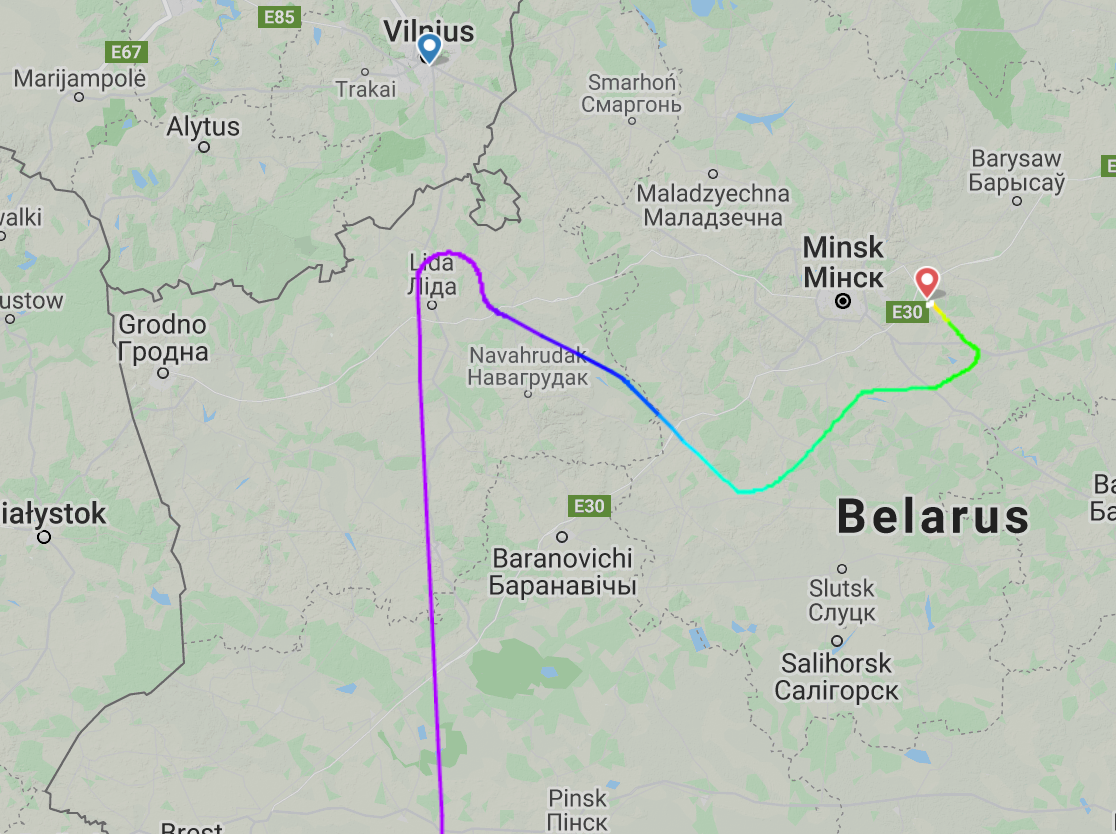Ryanair ‘hijack’ to Minsk could have serious consequences for Belarus
Analysis: Belarus airspace could be closed to EU and UK-registered aircraft if claims surrounding flight are substantiated

Your support helps us to tell the story
From reproductive rights to climate change to Big Tech, The Independent is on the ground when the story is developing. Whether it's investigating the financials of Elon Musk's pro-Trump PAC or producing our latest documentary, 'The A Word', which shines a light on the American women fighting for reproductive rights, we know how important it is to parse out the facts from the messaging.
At such a critical moment in US history, we need reporters on the ground. Your donation allows us to keep sending journalists to speak to both sides of the story.
The Independent is trusted by Americans across the entire political spectrum. And unlike many other quality news outlets, we choose not to lock Americans out of our reporting and analysis with paywalls. We believe quality journalism should be available to everyone, paid for by those who can afford it.
Your support makes all the difference.A budget airline flight between two European Union capitals is suddenly forced to land on the orders of a third country: Sunday’s diversion to Minsk of Ryanair flight 4978 from Athens to Vilnius looks deeply troubling.
The International Civil Aviation Organisation (ICAO) tweeted that it was “strongly concerned by the apparent forced landing of a Ryanair flight and its passengers, which could be in contravention of the Chicago Convention”.
The Boeing 737 aircraft was owned by an Irish airline and registered in Poland. It took off from the Greek capital at 10.29am, Greek time, for the 1,156-mile journey north to the capital of Lithuania with a reported 170 passengers on board .
This was the routine Sunday morning flight between the two cities on Europe’s biggest budget airline – on a northbound route that takes it over Bulgaria, Romania, western Ukraine and Belarus.
At 12.45pm, while in Belarus airspace, passengers would be expecting to begin the descent for an on-time arrival at Vilnius. Instead the plane slowed and turned east, landing half-an-hour later in Minsk.
A Belarusian dissident, Roman Protasevich, was aboard the Ryanair jet. He and his partner were apprehended when the plane landed in Minsk.
A Ryanair spokesperson said that air-traffic controllers in Belarus told the pilots of a “potential security threat on board” and instructed them “to divert to the nearest airport, Minsk”. Except the aircraft was just 60 miles south of its intended destination, Vilnius, and nearly twice as far from Minsk.
Had a genuine threat been perceived, the obvious course of action would be to continue the short distance to Vilnius.
While the Belarus capital might have been filed as an “alternate” destination in case of problems in Vilnius, there was no clear reason why the Lithuanian airport would not be used: it was operating normally, with a Ryanair flight from Barcelona and an SAS flight from Copenhagen arriving on either side of the appointed time for flight FR4978 to touch down.
The airline spokesman added: “Ryanair has notified the relevant national and European safety and security agencies.”
Ryanair is the safest airline in the world in terms of the number of passengers flown without a fatality. The incident appears to have been handled professionally by the crew. But anything that interferes with the normal operation of civilian flights is regarded gravely by aviation authorities.
The Polish MEP Radek Sikorski accused the Belarus government as “an act of implied violence against EU citizens”.
He told BBC Today: “For the sake of security of air travel in Europe and beyond, this unprecedented, outrageous action [must] not go unpunished.”
If it is shown that Belarus invented a security threat to force an EU passenger aircraft to divert for the purposes of arresting an opponent of President Alexander Lukashenko, the consequences could be very serious.
The European Union Aviation Safety Agency (Easa) would presumably close Belarus airspace to EU-registered aircraft, with the UK and others following suit.
The state airline, Belavia, might be banned from EU airspace and airports.
At a time when aviation is in serious need of stability, this event – and its possible repercussions – could undermine passenger confidence still further.
Join our commenting forum
Join thought-provoking conversations, follow other Independent readers and see their replies
Comments